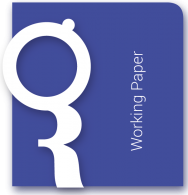
| Author(s) |
Amanda MOREIRA ALVES Eric BROUSSEAU |
| Publication type | Working paper |
| Reference | GovReg Working Paper series | Issue 2019/02 |
This work examines regulatory changes to the EU wholesale roaming market that were designed to facilitate the previously ratified roam-like-at-home (RLAH) policy in the retail market through the lens of the framework of political market for policy. This regulation was strategic not only for the European Commission, which sought to develop a single digital EU market, but also for telecommunications operators because of its impact on revenues. By studying written submissions and the options chosen in response to specific questions asked during the public consultation, we use topic modelling to identify two main focuses of the de- bate or clusters of stakeholders—one concerned with fair use policy issues and other with price issues. However, stakeholders lobbied for different outcomes even within a cluster, demonstrating intense competition among policy demanders. This fragmentation on the demand side of the political market provided room for the policy supplier, the European Commission, to react to lobbying efforts impartially. Regression results show that the Commission did not consistently favour certain stakeholders with specific characteristics. Instead, the Commission was consistent with its political agenda to promote a competitive internal market, and the public consultation in effect gave legitimacy to the regulatory changes.























